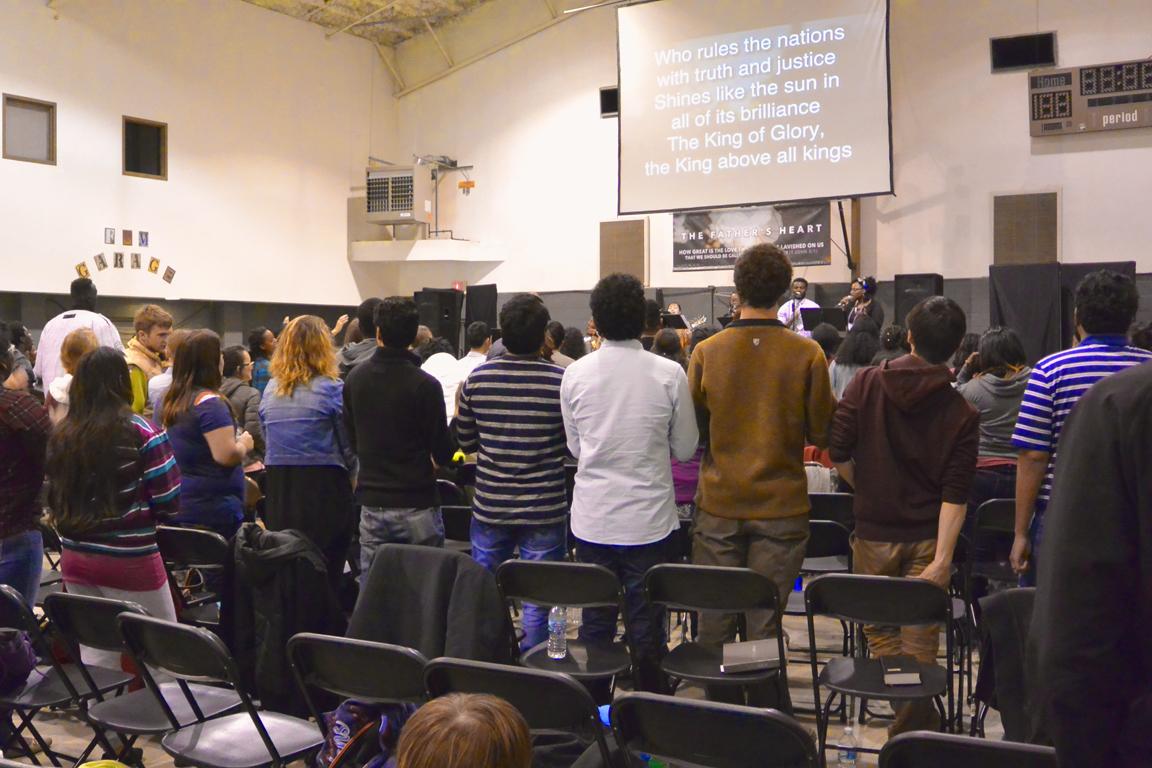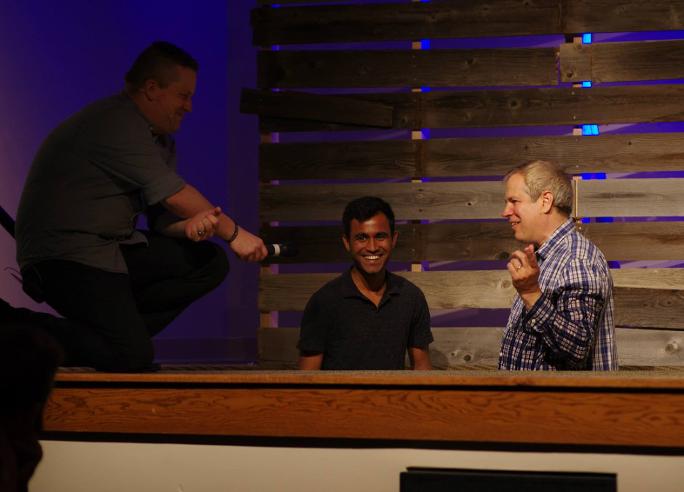Bryan and Cecile Ames
Chi Alpha Missionaries
SHARING JESUS'S LOVE WITH INTERNATIONAL STUDENTS

Why Support Missionaries?
Why Do We Need Partners?
How should missionaries be paid? Biblically, there can be only one answer to this question. As Paul says, the Lord has commanded that those who proclaim the gospel should get their living by the gospel (1 Cor 9.14). The teaching is very explicit. There are many examples of this principle being practiced in the Scriptures. Here are just a few:
- First and most significantly, Jesus’ ministry was funded by some of those who heard Him (Luke 8.1–3), and He taught the disciples to rely on others while ministering (Matthew 10.5–15).
- Second, Paul requested that the Roman church financially support Phoebe, one of the ministers at Cenchrae. (Romans 16.1–2)
- Third, Paul himself received support and was grateful for the support he received: Philippians 4.10–20 (people frequently assume that Paul always supported himself by making tents. Actually, that was the second-best option for him. See Acts 18.1–5, where Paul began by making tents and quit as soon as it was financially feasible to do so. See 1 Corinthians 9.1–18, where Paul’s whole point is that the Corinthians owed him support: he concludes the letter by telling them that he hopes to stop by and that he hopes they will provide for him to finish his journey in 1 Cor 16.5–6. Also see Romans 15.20–24, where Paul asks a church he has never visited before to fund him on his journey to Spain.) In addition, Paul explicitly teaches in Galatians 6.6 that Christians are obligated to provide for the needs of ministers.
- Fourth, the apostle John encouraged his friend to support a band of missionaries in 3 John 5–8.
- Fifth, the whole Levitical system in the Old Testament (the Levites were ministers) is predicated on the financial support of ministers by the rest of God’s people (Numbers 18.21–24 is a representative example). See Nehemiah 13.4–11 for how outraged Nehemiah was that the Levites had to go earn wages in another fashion.
In summary, there is an extremely strong Biblical case for missionaries raising financial support from the Body of Christ.

Which brings me to my point: we’re missionaries and we need your partnership! If you’d like to support our ministry financially, click here.
Incidentally, the word that we prefer to use when discussing financial supporters is partner. That word was chosen very carefully. If you’re curious, read about how missions is really a partnership.
Questions About Support Raising
Assemblies of God missionaries are not allowed to begin their mission until they have assembled a team of churches and individuals willing to fund their ministry. This often confuses people, so I thought I’d answer what I perceive to be the common questions:

Can You Just Give Me a Quick Explanation?
There is a consistent principle taught in the Scriptures: ministers should be paid by the people of God. In this regard, there are two broad categories of ministers: pastors, who are paid by the local congregations they serve, and missionaries, who are paid by others than the ones they are ministering to.
Chi Alpha campus workers are missionaries. The reason for this is very simple: college students don’t have any money! In addition, the college scene in American is as pagan as any place on earth, so there are few who would be willing to pay Christian workers even if they did have the resources to do so.
For this reason, then, Chi Alpha campus workers are required to build a support team to aid them in their ministry. Part of that support is prayer, part of it is emotional support, and part of it is financial support.
Is this Biblical?
Yes! For more detail, read our essay above on The Biblical Basis for Support-Raising.
Why doesn’t the church pay you?
The church is paying us. The church is not a building; the church is people!
Ha, ha. So why doesn’t your denomination pay you a salary?
If the denomination salaries missionaries, the money has to come from somewhere–and that somewhere is the churches. Effectively, it becomes a tax on churches.
Historically, denominations that tax churches this way have very few missionaries–nobody likes to pay taxes, not even churches. Raising support by contacting friends and family is a far more effective strategy. Plus, it’s the Biblical method!
It’s a scalable system. Every new missionary is required to go and generate the funds necessary for their own ministry. No matter how many missionaries we have, we can always have more because there’s no fixed allotment that all the missionaries have to compete for scraps of.
Raising support requires that a minister build a network of relationships which keep him accountable and motivate him to work diligently. If you know that your best friend is paying part of your salary, you’re much less inclined to goof off.
Missionaries beget missionaries! Most missionaries become missionaries through contact with another missionary.
Support-raising forces missionaries to develop relationships that ultimately result in the production of new missionaries.
Why do you have to raise your full budget first?
What does it mean to "raise your full budget"? Assembly of God United States Missions (AG US Missions) and Chi Alpha establishes a minimum amount of total monthly donations missionaries need to raise in order to be on the field. Missionaries do this by asking churches and individuals to make monthly contributions. When the total of the monthly contributions sent in match the minimum amount set by Chi Alpha and AG US Missions, then the missionary is has "raised their full support" or "raised their full budget". Why do missionaries need to raise a full budget before being on the field?
Because Chi Alpha wants long-term successes, not one-shot wonders. If missionaries reach their fields before they raise their full support, they are much more likely to fail their task. They become consumed with their work, and they eventually reach a point where they must either quit, get a part-time job, or live in unhealthy conditions. None of these things is conducive to long-term ministry. By forcing missionaries to raise their budget in full, the A/G contributes greatly to their longevity in ministry. By contributing to longevity they contribute to effectiveness.
Longevity aside, insufficient funding has immediate implications. Without a full budget our ability to minister is literally compromised. Our missionary budget is not just our salary! It’s actually the full organizational budget for our ministry. Out of that budget, a certain amount goes to our salary and the rest goes toward work expenses: without those funds ministry opportunities have to be passed up. Like everything else, ministry requires money.
Who oversees the finances?
We are accountable to Assemblies of God US Missions. All funds are routed through them in order to provide financial oversight for the missionaries.
How do I begin supporting your ministry?
Just follow these instructions.
Can you just work at "secular" job to support yourself, and also work in Chi Alpha?
We actually did that for the first four years we served in Chi Alpha. I was a computer programmer while serving in Chi Alpha. We felt led to serve in Chi Alpha full-time for the following reasons:
- Reaching international students with the gospel is a wonderful opportunity that is worthy of our full-time attention. Click here to see why the university is such a pivotal mission field.
- Some people work full-time in non-profit organizations such as The American Red Cross, and in many other worthy causes. The salaries of the people in these organizations are also paid through donations.
We know that sharing the transforming gospel to one of the most pivotal mission fields on earth is at least as worthy a cause as any of these other causes. - We simply could not give our mission to international students adequate attention while working a secular job.
The Apostle Paul was a tentmaker who supported himself while doing ministry? Should Chi Alpha missionaries do the same? Please see the essay above for the answer to this question.
©2020 Ames
